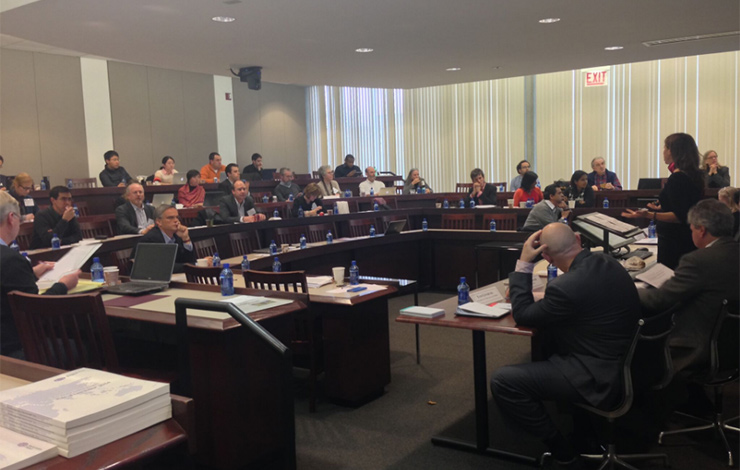
 Engaging with rule of law issues invariably means grappling with big ideas from multiple perspectives. Because scholars from around the world approach rule of law from different vantage points and academic disciplines, rule of law scholarship lacks the opportunities for collaboration and dialogue seen in more traditionally unified fields. Against this backdrop, the World Justice Project is proud to announce the Rule of Law Research Consortium (RLRC), a global and interdisciplinary scholarly group intended to ignite and facilitate rule of law research. As the core initiative of the WJP’s Research and Scholarship program, the Consortium will further the program’s commitment to examining the rule of law from all perspectives.
Engaging with rule of law issues invariably means grappling with big ideas from multiple perspectives. Because scholars from around the world approach rule of law from different vantage points and academic disciplines, rule of law scholarship lacks the opportunities for collaboration and dialogue seen in more traditionally unified fields. Against this backdrop, the World Justice Project is proud to announce the Rule of Law Research Consortium (RLRC), a global and interdisciplinary scholarly group intended to ignite and facilitate rule of law research. As the core initiative of the WJP’s Research and Scholarship program, the Consortium will further the program’s commitment to examining the rule of law from all perspectives.
Background & Activities
Until now, scholars in a number of disciplines—economics, political science, law, sociology, and anthropology—have studied the rule of law from their personal perspective. There has not been an institutional arrangement that convenes these experts across regions and disciplines to exchange and build on each other’s expertise. The Rule of Law Research Consortium is designed to provide venues for meetings and incentives for collaborations that will build the new generation of rule of law scholarship. The Consortium aims to be the premier repository for rule of law knowledge in the world.
The Consortium will contribute to setting the agenda for rule of law research through annual conferences and topical seminars that will address the pressing open questions for the field. Joint conferences with partner organizations will also offer scholars a chance to meet with policymakers and practitioners to discuss key rule of law issues and how to solve them. A research paper series will cultivate new ideas and drive scholarly production while online collaboration platforms will ensure that production can continue remotely.
Members
The current membership of the consortium is composed of scholars from around the world at the top of their field. They are:
Benito Arrunada — Business, Universitat Pompeu Fabra
Tim Besley* — Economics / Political Science, London School of Economics
Nehal Bhuta — Law, European University Institute
Rosa Brooks — Law, Georgetown University
David Caron — Law, King’s College London
Thomas Carothers — Law, Carnegie Endowment
Yun-Chien Chang — Law, Academica Sinica
Albert Chen — Law, Hong Kong University
John Comaroff — Anthropology, Harvard University
Mariano-Florentino Cuellar — Law, Stanford University
Kevin Davis — Law, New York University
Larry Diamond — Political Science, Stanford University
Brad Epperly* — Political Science, University of South Carolina
Julio Rios Figueroa — Political Science, Centro de Investigación y Docen- cia Económicas
Bryant Garth — Law, Southwestern Law School
James Gathii — Law, Loyola University Chicago
Tom Ginsburg, Co-Chair* — Law/Political Science, University of Chicago
Jon Gould — Law, American University
Gillian Hadfield — Law, University of Southern California
John Hagan — Economics, Harvard University
Gretchen Helmke — Political Science, University of Rochester
Susan Hirsch* — Anthropology, George Mason University
Erik Jensen — Law, Stanford University
Hamid Khan — Law, George Washington University
Rachel Kleinfeld — International Relations, Carnegie Endowment
Jack Knight* — Law/Political Science, Duke University
Timur Kuran — Economics, Duke University
Margaret Levi* — Political Science, University of Washington
Beatriz Magaloni* — Political Science, Stanford University
Jenny Martinez — Law, Stanford University
James Melton — Political Science, University College London
Sally Merry — Anthropology, New York University
Smoki Musaraj — Anthropology, University of California-Irvine
Robert Nelson, Co-Chair* — Sociology/Law, Northwestern University
Eric Neumayer — Environment / Development, London School of Economics
Randy Peerenboom — Law, La Trobe University
Jothie Rajah — Law, American Bar Foundation
Anita Ramasastry — Law, University of Washington
Bo Rothstein — Political Science, University of Gothenburg
Andrei Shleifer — Economics, Harvard University
Kim Lane Scheppele — Law/Sociology, Princeton University
David Shirk — Political Science, University of San Diego
Svend-Erik Skaaning — Political Science, Aarhaus University
Kellye Testy — Law, University of Washington
Francesco Trebbi — Economics, University of British Columbia
Renata Uitz — Law, Central European University
Thierry Verdier — Economics, Paris School of Economics
Mila Versteeg — Law, University of Virginia
Stefan Voigt* — Economics, University of Hamburg
Barry Weingast — Political Science, Stanford University
Bruce Western — Sociology, Harvard University
Jennifer Widner — Political Science, Princeton University
Michael Woolcock* — Sociology, World Bank
Qianfan Zhang — Law, Peking University
*Founding members
Upcoming Events
Members of the Consortium will participate in two events in the Fall of this year. In September, some members of the Consortium will participate in a policy-relevant workshop on violence and the rule of law with other scholars, policy experts, and practitioners. The conference, which centers on three thematic areas—marginalized communities, organized crime, and political violence—is being held at Stanford University and co-hosted by the WJP, Carnegie Endowment for International Peace, and the Center for Democracy, Development, and the Rule of Law at Stanford University. The workshop seeks to take stock of efforts to address these forms of violence and determine the most pressing areas for future research.
In October, the Consortium itself will meet at the University of Chicago for its first annual conference. The meeting will feature presentations of work across all areas of rule of law research with an eye towards assessing the current state of scholarship and determining a research agenda. Members will also discuss what they would like to see take place at Consortium events and how the group ought to proceed most effectively.
Photo: World Justice Project






